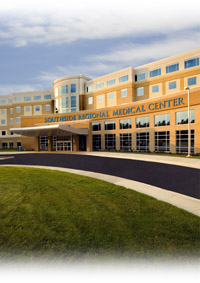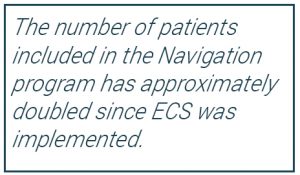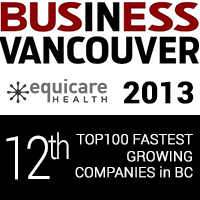“EQUICARE CS is incredibly intuitive and user friendly. The great service and easy-to-use interface has made implementing ECS at Southside extremely easy, and we’re very pleased with the results.”
Lori McNulty, RN,
Oncology Nurse Navigator, SRMC
 Download the SRMC Case Study (pdf)
Download the SRMC Case Study (pdf)
BACKGROUND
 The Cancer Center at Southside Regional Medical Center (SRMC) offers advanced technology for treating a wide range of cancers and is fully accredited with Commendation by the American College of Surgeons (ACS) Commission on Cancer (CoC). SRMC has a busy radiation therapy center that diagnoses nearly 500 new cases of cancer each year. In 2012 the center introduced a medical oncology program, added a full time Nurse Navigator to their team, and began seeking a software tool that would enable the provision of organized navigation and survivorship care for their patients. Additionally, as the next phase of CoC accreditation requires that cancer centers have a formal plan for the delivery of continuum of care services (which include navigation, psychosocial distress screening and survivorship programs), SRMC wanted to be proactive in providing these programs to maintain their accreditation.
The Cancer Center at Southside Regional Medical Center (SRMC) offers advanced technology for treating a wide range of cancers and is fully accredited with Commendation by the American College of Surgeons (ACS) Commission on Cancer (CoC). SRMC has a busy radiation therapy center that diagnoses nearly 500 new cases of cancer each year. In 2012 the center introduced a medical oncology program, added a full time Nurse Navigator to their team, and began seeking a software tool that would enable the provision of organized navigation and survivorship care for their patients. Additionally, as the next phase of CoC accreditation requires that cancer centers have a formal plan for the delivery of continuum of care services (which include navigation, psychosocial distress screening and survivorship programs), SRMC wanted to be proactive in providing these programs to maintain their accreditation.
Initially using a paper based system to track patient navigation, SRMC was seeking a software solution that would provide the tools necessary for the Navigator to centrally track patients in both Radiation and Medical Oncology. SRMC was also looking to provide long term survivorship care plans, distress assessments, questionnaires, and educational materials for their patients. SRMC wanted to ensure that all of the information collected through the system would be available to the full care team, including care providers working externally. Finally, with a rapidly growing cancer program, SRMC also wanted to ensure that their selected solution was scalable, intuitive and easy to use, with minimal administrative overhead.
SOLUTION
 Southside Cancer center selected EQUICARE CS (ECS) as their navigation and survivorship tool in March 2012 and went live with the system three months later in June 2012. The installation process began with a kick off meeting at which members of both the Equicare and SRMC teams discussed and agreed upon IT needs, workflows and other system configurations, and was followed by routinely scheduled status meetings to ensure the process went smoothly. SRMC’s Nurse Navigator is the primary system user and administrator, but ECS is also used by infusion nurses, social workers interns and others.
Southside Cancer center selected EQUICARE CS (ECS) as their navigation and survivorship tool in March 2012 and went live with the system three months later in June 2012. The installation process began with a kick off meeting at which members of both the Equicare and SRMC teams discussed and agreed upon IT needs, workflows and other system configurations, and was followed by routinely scheduled status meetings to ensure the process went smoothly. SRMC’s Nurse Navigator is the primary system user and administrator, but ECS is also used by infusion nurses, social workers interns and others.
SRMC analyzed their workflows and use cases prior to installation and as a result, were able to launch with customizations specific to their organization including unique documentation, specific categorization and display of various assessments, and several custom fields. Equicare provided training, suggestions, and back-end development, but with the configurable design of ECS, the SRMC team was able to perform many configurations on their own. SRMC ramped up their Navigation program over a period of time and as of April 2013 all patients requiring Navigation were entered using ECS.
SRMC’s nurse navigator uses the system to track referrals and patient appointments, distribute and collect responses to distress screening assessments, add notes to patient records, assess pain, provide nutritional and educational information, and track the financial resources that are sourced for patients. The system is also used to generate a variety of reports including system utilization and user time tracking, referrals assessment, changes in patient distress over time, patient outcomes, and navigational summaries. SRMC uses the survivorship functionality in ECS to provide their radiation oncology patients with long term survivorship care plans that include treatment summaries, care team information, follow-up plans, and educational information specific to each patient. This printed plan is generated through ECS by the radiation therapy RN, and then provided to patients at the one month follow up appointment after radiation completion.
Results
EQUICARE CS meets the needs of SRMC by providing organizational, clinical, and administrative benefits, as well as enabling their maintenance of accreditation compliance. By taking advantage of the navigation features in ECS, the center can include more patients in their navigation program, and by providing survivorship care plans and distress assessments they may also improve the quality of care for patients. With EQUICARE CS, Southside is on track to provide full navigation, psychosocial distress screening, and survivorship programs in order to meet the next phase of CoC accreditation requirements.
Through ECS, SRMC’s Nurse Navigator has the tools to become more efficient in tracking referrals, appointments and assessments, and the center can therefore include more patients in the navigation program. The number of patients included in the Navigation program has approximately doubled since ECS was implemented. Additionally, Equicare’s navigation tools provide the center with a centralized way to store and access documents, patient details, and care team information, which ensures that accurate data is available to all members of the care team, regardless of their physical location. As the center continues to grow, they will also have the capability to easily scale their program to include more campuses and care team members.
By providing patients with distress assessments and questionnaires that can be completed prior to their appointments, SRMC minimizes the time patients spend waiting in the clinic, which may improve satisfaction with care. Additionally, through analysis of patient responses, SRMC now provides feedback to patients in distress, and aggregates population data to determine points of care where the patient experience can be improved. SRMC’s provision of long term care plans in printed format can also improve patient care by reducing the distress patients may feel at the end of treatment, which is often a time of uncertainty
Prior to ECS implementation, the generation of printed care plans was prohibitively time-consuming, and so this information was shared with patients orally. Through ECS survivorship care plans are now provided to 100% of Radiation Oncology patients, many of whom have provided positive feedback to the center on the content of these plans. Additionally, the inclusion of targeted educational material in these plans ensures patients are aware of side and late effects of treatment, and provides suggestions for health and nutritional activities that can improve outcomes.
As a busy and growing cancer center, it was important for SRMC to minimize the administrative overhead involved in implementing a new tool like ECS. The Equicare project team fixed issues as they arose, and also added feature requests to the product road map to ensure future releases better meet SRMC (and other customer) needs. ECS was intuitive and easy for SRMC’s team to learn, and the software has rapidly become an integral part of their cancer program.
SRMC sought out a care coordination solution to improve the quality of care for patients, and thereby maintain CoC accreditation; with ECS, the center is on track to do both. Not only do the tools in ECS provide functionality to improve the patient experience and meet CoC requirements for continuum of care, but the reports generated by ECS make providing information to auditors faster and easier. Additionally, by documenting Navigator time, and the benefits to patients, SRMC can rapidly evaluate and rationalize the investment in a Navigation program.
ABOUT SOUTHSIDE REGIONAL MEDICAL CENTER
 Southside Regional Medical Center is a 300-bed, general acute care hospital located in central Virginia. The hospital has more than 1,500 employees and the medical staff is comprised of nearly 340 physicians representing more than 35 specialties. The 420,000 square foot facility is situated on a 50-acre campus and offers the latest technology in order to serve more than 200,000 local residents. SRMC offers a full array of comprehensive outpatient services on its main campus and boasts five satellite outpatient centers: Southside Regional Renal Services (Petersburg), Southside Behavioral Health Services (Petersburg), Southside Rehabilitation Services (Petersburg and Colonial Heights), and Colonial Heights Imaging, a full service diagnostic imaging center (Colonial Heights). The hospital is also home to three professional schools: Southside Regional Medical Center School of Nursing, School of Radiation Sciences, and School of Diagnostic Medical Sonography. A new cancer center will open on campus, adjacent to the hospital in January, 2014. For more information, please visit: www.srmconline.com
Southside Regional Medical Center is a 300-bed, general acute care hospital located in central Virginia. The hospital has more than 1,500 employees and the medical staff is comprised of nearly 340 physicians representing more than 35 specialties. The 420,000 square foot facility is situated on a 50-acre campus and offers the latest technology in order to serve more than 200,000 local residents. SRMC offers a full array of comprehensive outpatient services on its main campus and boasts five satellite outpatient centers: Southside Regional Renal Services (Petersburg), Southside Behavioral Health Services (Petersburg), Southside Rehabilitation Services (Petersburg and Colonial Heights), and Colonial Heights Imaging, a full service diagnostic imaging center (Colonial Heights). The hospital is also home to three professional schools: Southside Regional Medical Center School of Nursing, School of Radiation Sciences, and School of Diagnostic Medical Sonography. A new cancer center will open on campus, adjacent to the hospital in January, 2014. For more information, please visit: www.srmconline.com

 logy to improve outcomes for patient. She will manage the Southeastern USA sales region, and we’re thrilled to have her on board.
logy to improve outcomes for patient. She will manage the Southeastern USA sales region, and we’re thrilled to have her on board.
 The Cancer Center at
The Cancer Center at  Southside Cancer center selected
Southside Cancer center selected 
